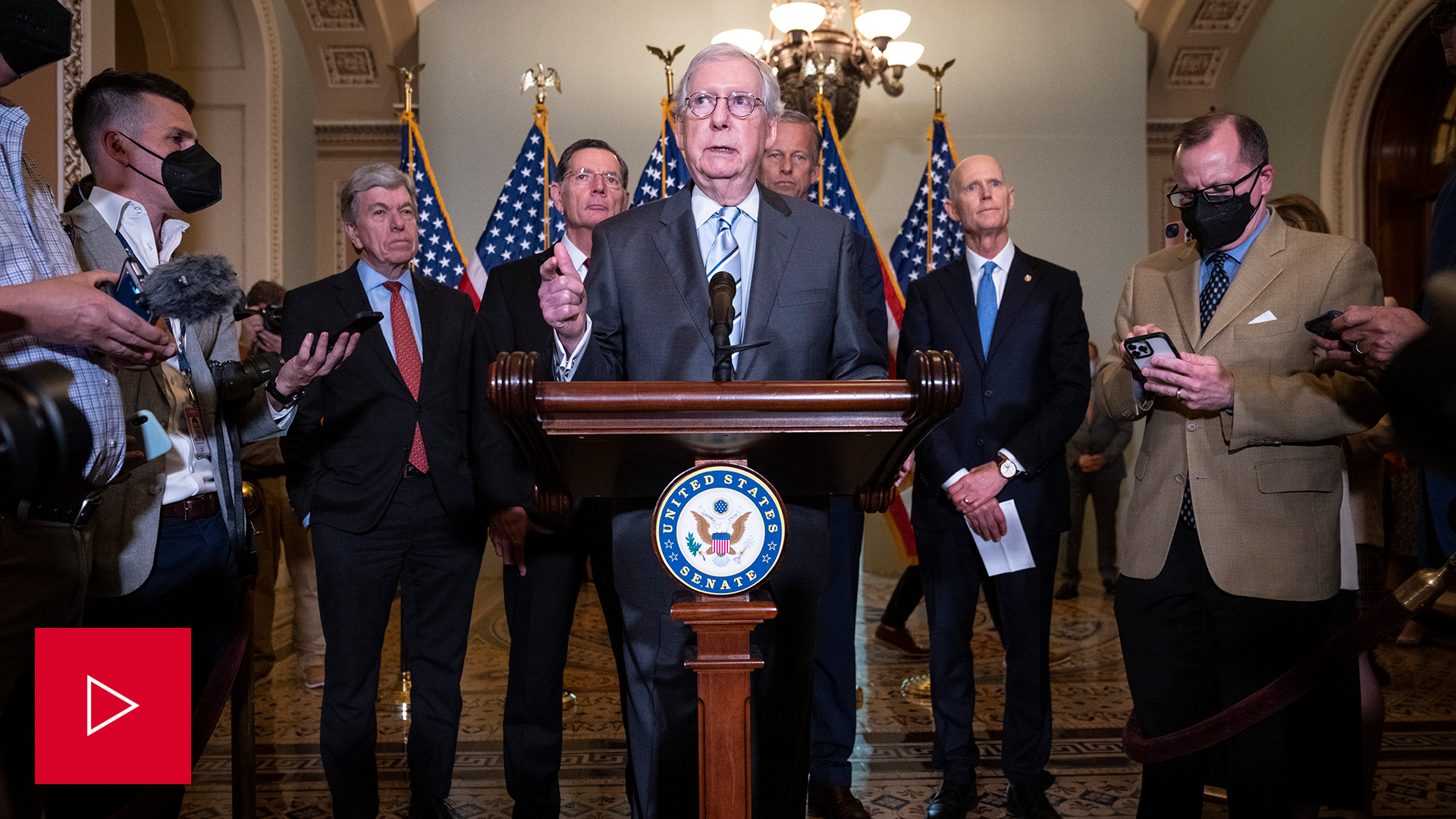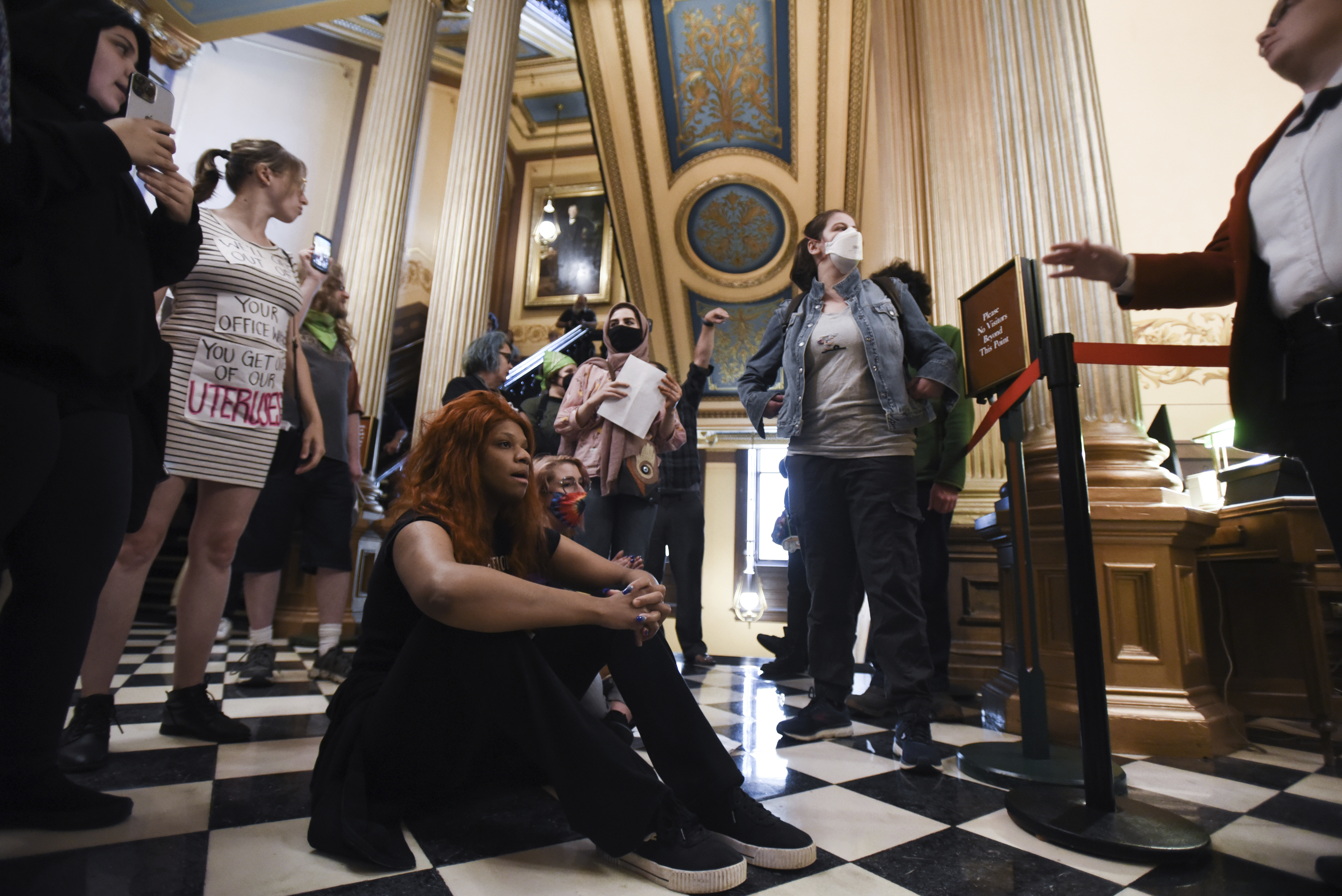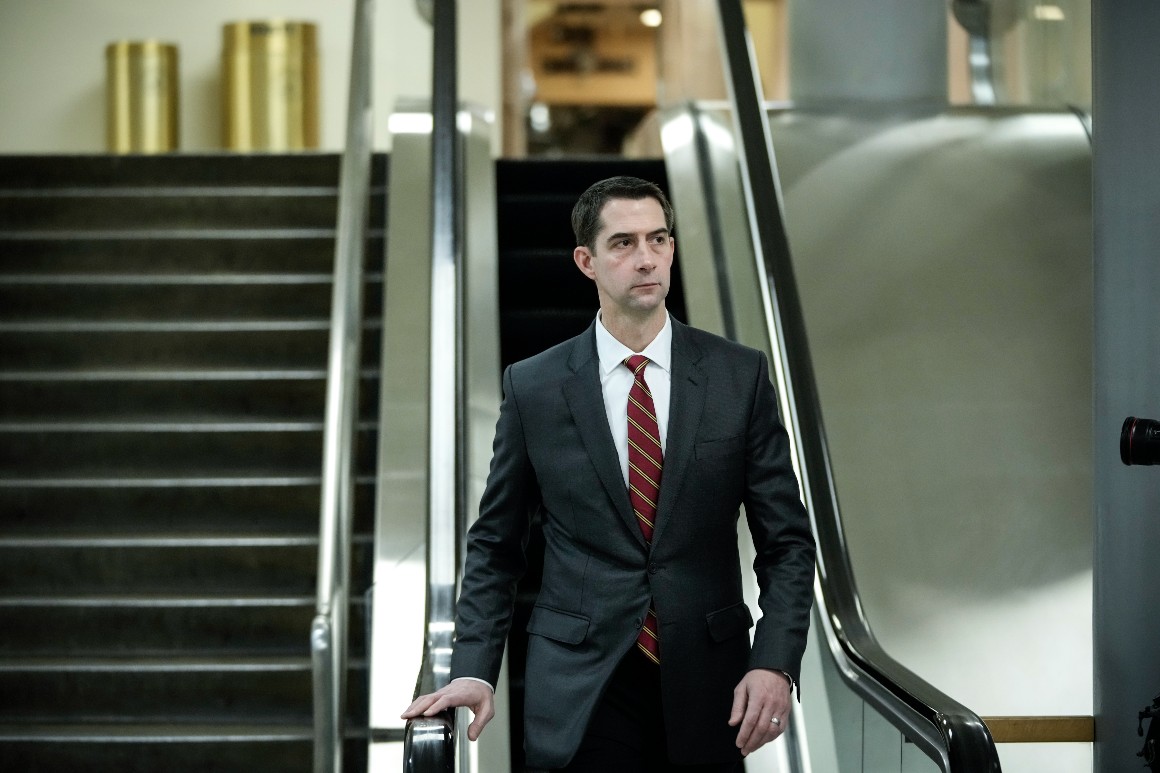| | |  | BY JOANNE KENEN | | With help from Myah Ward ELECTION NIGHT — Watch the results come in tonight on POLITICO’s live results pages for the primaries in Maine, Nevada, North Dakota and South Carolina, plus the special election in Texas’ 34th District to replace former Democratic Rep. Filemon Vela. And tune in to see our campaigns team’s minute-by-minute analysis in a live chat starting around 7:30pm ET. Zach Montellaro has you covered with a rundown of what tonight’s primaries mean for the weight of former President Donald Trump’s endorsement inside the GOP.
| 
| THE FAILURE LAST TIME — This afternoon, Senate Republican leader Mitch McConnell said he’s “comfortable” with the bipartisan framework for gun legislation. It’s a big deal. Maybe with McConnell’s blessing, the legislation might pass. It won’t be easy. For more than 20 years, since two high schoolers went on a killing spree at Columbine High School in Littleton, Colo., any and all significant gun regulation has failed to pass Congress — largely because of the presumed power of the National Rifle Association. Yet one of the leading experts on U.S. gun politics — Robert Spitzer, professor emeritus at SUNY Cortland — says that politicians’ fear of the NRA’s power is misplaced. Five years before Columbine, it became an article of faith in Washington that the NRA’s wrath over the assault weapons ban enabled Republicans to break the Democrats’ 40-year hold on the House in 1994, launching Newt Gingrich and a new generation of hard-edged conservative activism in Washington. That’s not the real story, Spitzer told Nightly. Years of empirical research, he said, shows that “lots of incumbent Democrats were in districts where the population had become more Republican and more conservative” in 1994. “They were ripe for defeat,” he said. And they were defeated. Yet the idea that the assault weapons ban — and not demographics — cost them their seats still drives political behavior today. As President Joe Biden surely knows, the party that controls the White House almost always takes a shellacking in the midterm elections — and 1994 was midway through Bill Clinton’s first term. Assault weapons were not the only thing that pushed voters away from Clinton’s agenda. (You might remember health care, but we suspect you’ve forgotten about the BTU tax.) Plus, Gingrich “was really good,” Spitzer said. He recruited “strong, viable candidates” for districts that had become more conservative. Yet even today, with a greatly diminished NRA, of the 10 Senate Republicans who worked on the bipartisan gun-law framework, none are up for election this year. Four are retiring. Most of the rest won’t face voters until 2026. So, had you asked Spitzer a few weeks ago if Congress would take up gun legislation, he would have said “zero chance.” After the shootings in Buffalo and Uvalde, he saw “a crack of daylight.” Now, with the Senate bipartisan framework in play, he sees “light at the end of the tunnel.” A bill — modest but not meaningless — could pass. But we’re still in the tunnel. And we’ve been here before. Welcome to POLITICO Nightly. Reach out with news, tips and ideas at nightly@politico.com. Or contact tonight’s author on Twitter at @JoanneKenen.
| |
A message from Facebook: Facebook is taking action to keep its platform safe
We have over 40,000 people working on safety and security across our platforms. That’s more than the size of the FBI.
And it's just one example of the work we’re doing to create safer connections for our communities.
Learn more about our work ahead. | | | If you had to pick a single turning point in the long, uniquely American saga of gun politics, it would probably be Columbine. Twenty-three years later, it’s hard to remember how shocked we were then — and how long we remained shocked, back when mass shootings with double-digit casualties were rare. After the Columbine shooting on April 20, 1999, Congress — in fact, a Congress with Republican majorities in both the House and Senate — came within reach of passing gun legislation far more comprehensive than the framework being discussed today. Within weeks, a bill that would have closed the “gun show loophole,” among other things, was on the Senate floor. It was swiftly killed on a procedural vote. Remarkably, the Senate reversed itself — whether out of pangs of conscience or political calculus, who knows. Six days later, on the one-month anniversary of Columbine, a slightly modified version narrowly passed the GOP-dominated Senate, with then-Vice President Al Gore casting the tie-breaking vote. The House vote a month later was probably the most dramatic I witnessed in my years covering the Hill. Then-Rep. Carolyn McCarthy (D-N.Y.), a nurse who ran for office with a single-minded focus on guns after her husband was killed and her son injured by a gunman on the Long Island Railroad, begged her colleagues to listen to their hearts, not to the gun lobby. “Let me go home,”she pleaded at 1 a.m., her voice breaking. “Let me go home.” She got a standing ovation. Then the bill went down. Months passed. The Million Mom March came and went, on Mother’s Day 2000. There were other pathways for a House-Senate deal, but they languished. Then the whole effort died. A few years later, in 2004, the assault weapons ban, which was in effect at the time of Columbine, would expire. It has never been renewed, and it won’t be now. The biggest federal gun law passed since then was a win for the gun industry — a 2005 bill that gave manufacturers and dealers protection from civil lawsuits. In the ’90s, gun votes were partisan, but not hyper-partisan. Moderate Republicans — and Democrats from gun rights states in the South and Upper Midwest — crossed party lines, Spitzer reminded us. It was a bipartisan duo of heavyweights who derailed the post-Columbine bill: GOP Majority Whip Tom DeLay of Texas and Michigan Democrat John Dingell, a towering presence in the House for decades who was a liberal on many social issues, but not on guns. In fact, he had served on the NRA board. With Congress so divided, most of the gun legislation in recent years has played out in the states. After the 2012 Sandy Hook elementary school murders, blue states (plus Florida after Parkland) have tightened gun laws. In the red half of the country, states loosened them, particularly around concealed carry. And while there’s less reason than ever for politicians to fear the NRA, even Spitzer concedes that politicians have some reason to respect the voting influence of gun rights supporters. “It’s not a No. 1 concern for most Americans,” he said of guns. “It is for the gun people.”
| |
| | DON'T MISS DIGITAL FUTURE DAILY - OUR TECHNOLOGY NEWSLETTER, RE-IMAGINED: Technology is always evolving, and our new tech-obsessed newsletter is too! Digital Future Daily unlocks the most important stories determining the future of technology, from Washington to Silicon Valley and innovation power centers around the world. Readers get an in-depth look at how the next wave of tech will reshape civic and political life, including activism, fundraising, lobbying and legislating. Go inside the minds of the biggest tech players, policymakers and regulators to learn how their decisions affect our lives. Don't miss out, subscribe today. | | | | | | | | 
Abortion rights advocates rally outside the Michigan State House floor Wednesday, June 8, 2022, in Lansing, Mich. | Matthew Dae Smith/Lansing State Journal via AP | STATES OF PLAY — The Supreme Court is set to release more opinions Wednesday, as Americans eagerly await the court’s decision on whether it will overturn Roe v. Wade. It’s likely we won’t see the Dobbs v. Jackson Women’s Health Organization ruling this week, but it’s coming this month. We might, however, see other decisions that “trigger a state-by-state battle for the new shape of laws and American civic life,” David Berstein writes in POLITICO Magazine. The cases may sound dry, but “their implications could be sweeping” — shifting the battles over some of the nation’s most contentious issues to the states. Democrats are already gearing up for the Dobbs decision, one that could bolster their message that state legislatures are more important now than they’ve ever been. Nightly’s Myah Ward talked with Jessica Post, the president of the Democratic Legislative Campaign Committee, the group charged with helping elect Democrats to state legislatures, about its 2022 strategy and how the fate of Roe factors into their game plan for protecting and flipping statehouses. This conversation has been edited. There’s a well-known problem of low turnout during midterms. Voters also have short attention spans. Do you think abortion is an issue that could bring more voters to the polls to November? We know that we’re facing headwinds. History tells us that midterm elections are always challenging. But one of the reasons they’re challenging is because the Republican base is highly mobilized. But this has the potential to be a hugely mobilizing issue to our Democratic base that sometimes does not vote in midterm elections. Republicans just elevated an issue that deeply angers and motivates the Democratic base and repels swing voters. So heading into a tough election cycle, that really matters. What’s your strategy for getting voters to turn out? A lot of our work is figuring out the composition of an electorate that would be favorable to a state legislative Democratic candidate. We do a lot of work at the DLCC providing data, providing lists of targeted voters, door-knocking and phone-calling lists for candidates across the country to figure out which voters might be more receptive to our candidates’ messages. Every Democratic state legislature has done something to protect abortion rights in their states, including codifying Roe , expanding access for providers or passing landmark women’s health legislation. So we know that when Democrats win state legislatures or hold on to state legislatures, they will protect Roe v. Wade, and Republicans in 26 states are ready to do everything they can to ban abortion access. Voters, I think, will remember the day that Roe was banned. I think it’ll be a significant moment in history. Do you feel the abortion issue has made some districts or legislatures new opportunities for Democrats to take in November? I think certainly New Hampshire — that’s a Live Free or Die state — has always been an abortion rights state, where they view this as a very personal decision. So it elevates that, especially because Republican Gov. Chris Sununu was very popular in the 2020 elections, and this is something that has made him a lot less popular in the state. We also think that this could make the Pennsylvania House increasingly competitive because of all the targeted districts in the suburbs. In the Pennsylvania state Senate, it’s sort of the same story. In many of our targeted districts in Michigan, many of these suburban districts are extremely pro-choice places. I’m curious what states the DLCC sees as vital for Democrats to win in November. We’re working on how many states do we need to protect: The Republicans have already said they’re going after the legislative chambers in Colorado, Maine and Minnesota, and we have narrow margins in all of those states. And in cycles like 2014, Democrats have lost those majorities. So we’re being very clear-eyed and understanding that we need to do everything we can to protect the majorities in those states. Nevada is another state we’re watching closely. New Mexico. Those are all Democratic-majority states. Then looking at potential flips, we talked about Michigan, both legislative chambers there. New Hampshire. The Minnesota state Senate. We’re also looking at the Pennsylvania House and Senate. Both chambers in Arizona. And finally, we’re looking at long-term growth in states like Georgia. Even though we have raised a record amount — we’ve raised more than $32 million so far this election cycle — the Republicans raised about $100 million the last cycle, and a lot of that was spent on state legislative races in 2020. We’re really in a hand-to-hand, state-by-state battle for the future of our country.
| |
| | A message from Facebook:  
| | | | | — FDA advisers vote to recommend Moderna vaccine for kids 6-17: The FDA’s independent vaccine advisers unanimously voted today to recommend the agency authorize Moderna’s Covid-19 vaccine for teens and for children as young as 6, after a daylong meeting in which panel members largely agreed that the benefits of having another vaccine available to these age groups outweigh the potential risks. Both age groups — 12- to 17-year-olds and 6- to 11-year-olds — have had access to the Pfizer-BioNTech vaccine since May 2021 and November 2021, respectively. — Biden to travel to Middle East in July: Biden will make stops in Israel, the West Bank and then Saudi Arabia , where he’ll seek to rebuild relations after vowing to make the kingdom a “pariah.” He’ll be in the region July 13-16 and meet with more than a dozen of his counterparts, a senior administration official said, adding that the final leg of the trip, in Jeddah, Saudi Arabia, could shape the administration’s goals in the region for the rest of the year and 2023. The highly anticipated visit to the oil-rich kingdom will be met with mixed reception as the president ventures to address high gas prices and inflation at home while also not muddying the administration’s promises to keep human rights at the center of its foreign policy doctrine. — Immigration reform would ease inflation, donors tell GOP leaders: In a letter to McConnell and House Minority Leader Kevin McCarthy to be sent tomorrow, 14 donors who call themselves “life-long Republicans” said that reaching a deal on immigration that provides permanent legal status to immigrants brought to the U.S. illegally as children, known as Dreamers, “makes economic sense” because it would help to ease labor shortages, reduce food prices and create jobs. Republican leaders have expressed little interest in Democrats’ attempts at immigration reform. — House sends increased Supreme Court security bill to Biden: The bill, which passed the House 396-27 this afternoon, was spearheaded by Sens. John Cornyn (R-Texas) and Chris Coons (D-Del.), and passed the Senate unanimously more than a month ago. Momentum for the bill was driven by protests outside justices’ homes in the wake of the draft abortion opinion, published by POLITICO, that would strike down Roe v. Wade. Republican lawmakers, including McConnell, renewed calls for its House passage last week after a man who was picked up by law enforcement outside Justice Brett Kavanaugh’s home was charged with attempted murder. — Canada drops vaccine mandates for domestic travel: Unvaccinated Canadians will be able to fly domestically and abroad as of June 20, a move that follows months of intensifying pressure on Prime Minister Justin Trudeau to abandon Covid-19 public health restrictions. Incoming foreigners will still have to be vaccinated against Covid-19 if they hope to enter the country, while unvaccinated Canadians must continue to adhere to quarantine guidelines upon arrival. “If the situation takes a turn for the worse, we are prepared to bring back the policies necessary to protect Canadians,” Intergovernmental Affairs Minister Dominic LeBlanc said.
| |
| | STEP INSIDE THE WEST WING: What's really happening in West Wing offices? Find out who's up, who's down, and who really has the president’s ear in our West Wing Playbook newsletter, the insider's guide to the Biden White House and Cabinet. For buzzy nuggets and details that you won't find anywhere else, subscribe today. | | | | | | | U.S. TO BUILD GRAIN SILOS FOR UKRAINE — Biden said today that the U.S. will build temporary silos on Poland’s border with Ukraine to facilitate the export of grain out of the war-torn nation and address surging food prices after Russia’s invasion, write Kelly Hooper and Meredith Lee. U.S. and Western officials have been exploring efforts to build temporary silos in Ukraine and other nations as a means to quickly scale up grain storage capacity in Ukraine, where a Russian naval blockade is holding back more than 25 million tons of grain from the world food supply. Russia’s blockade in the Black Sea has upended global trade routes while threatening to financially strangle Ukraine and deepen hunger crises around the world. In the next month, Ukrainian farmers will start harvesting the summer wheat harvest, but won’t have anywhere to store it, Ukrainian officials have warned. U.S. officials and lawmakers are also worried that food shortages, along with rising fuel and food prices, could spark mass starvation, political unrest and migration across parts of Africa, the Middle East and, possibly, Central America, in the coming months.
| | | |
At least 39 The number of countries monkeypox has spread to. A total of 1,600 confirmed cases and an additional 1,500 cases have been reported to the World Health Organization, which is convening its emergency committee next week to decide whether the outbreak is a public health emergency of international concern — the world’s highest health alert. |
| | | | 
Sen. Tom Cotton walks through the Senate Subway. | Drew Angerer/Getty Images | STILL NEVER TOO EARLY — Arkansas Sen. Tom Cotton huddled with two dozen of his top donors this morning to describe his planning for a potential 2024 White House campaign, telling them a comeback bid by Trump wouldn’t deter him from running. During the meeting at the Hay-Adams hotel in Washington, which was described by two attendees, Cotton said he was prepared to run and detailed the work he’s done to develop an infrastructure for a national campaign. He emphasized that he wouldn’t defer to any other would-be candidates — including Trump — and said he planned to make a final decision on whether to run after this year’s midterm election, writes Alex Isenstadt. While the 45-year-old senator lacks the national profile of some other would-be candidates, such as Trump and Florida Gov. Ron DeSantis, his team made a case for why the Arkansas Republican should be considered a serious contender. The gathering is the latest move in an intensifying competition among potential candidates to court major donors. South Carolina Sen. Tim Scott has established an allied super PAC that has drawn large contributions from the likes of tech giant Larry Ellison and Las Vegas billionaire Steve Wynn. DeSantis has been crisscrossing the country to raise money for his 2022 reelection bid, developing relationships with givers who could form the foundation of a financial network for a national campaign. And former U.N. ambassador Nikki Haley has set up a political action committee that has received checks from major donors like New York hedge fund manager Paul Singer. Did someone forward this email to you? Sign up here.
| |
A message from Facebook: Over 40 million people use Facebook Privacy Checkup each month
That’s nearly 60 times the population of Washington, D.C.
And that’s just one example of the tools and technologies we’re building to keep our communities safe.
Facebook is taking action to keep its platform safe.
Learn more about our work ahead. | | | | |
|
| | Follow us on Twitter | | | FOLLOW US | | |
| |

No comments:
Post a Comment
Note: Only a member of this blog may post a comment.